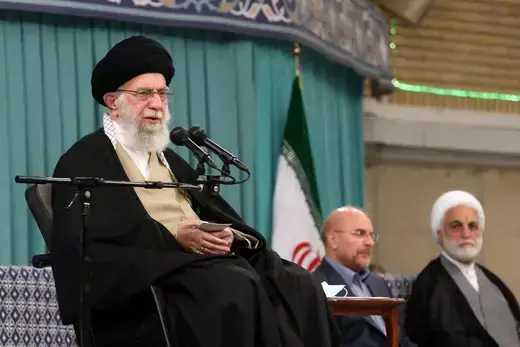Ray Takeyh
Iran has greeted the attack by Palestinian militant forces on Israel and with its backing of Hamas and Hezbollah has been working to coordinate pressure on Israel, threatening further escalation of the shadow war between the two countries.
What do we know about the extent of Iran’s support of Hamas and its possible backing of Saturday’s attack?
Iran has been a generous supporter of Hamas for a number of years in terms of financial assistance and military hardware. This particularly is the case with missiles. The Iranian regime has been an outspoken supporter of Saturday’s attack in its public declarations including staging street celebrations to celebrate the attack.
Some observers have said the timing of the attack helps Iran in its effort to scuttle an Israeli-Saudi peace deal. Do you agree?
Yes. In the past few weeks Iran has been strident in its attacks on the Saudi-Israeli normalization agreement. The normalization agreement, if successful, threatens to mobilize the region against Iran and Iran is keen to disrupt such plans. Last week, Iranian Supreme Leader Ali Khamenei said regional “countries that make the gamble of normalization with Israel will lose.”
In the same setting, Khamenei added the following about morale among the Palestinians: “Today, the Palestinian movement is more cheerful than ever in the past seventy and eighty years, and the Palestinian youth and the anti-usurpation, anti-oppression and anti-Zionism movement are more cheerful, more lively, more ready than ever, as you can see.”

Iran's Supreme Leader Ayatollah Ali Khamenei speaks during a meeting with the guests of the Islamic Unity Conference in Tehran, Iran Wana News Agency
What are the prospects of an intensifying Israeli-Iranian proxy war resulting from the assault and/or stepped up efforts by of each side targeting the other's assets?
The shadow war between Israel and Iran has been taking place for a while. As recently as the spring, the head of the Revolutionary Guard Quds Brigade, General Esmail Qaani, is reported to have held meetings with militant actors, including representatives of Hamas, and urged them to coordinate their attacks on Israel. Israel for a number of years has targeted Iranian officials and scientists as well as Iranians active with proxy forces in Syria. All this is likely to be aggravated by Saturday’s attack on Israel.
Should we expect stepped up activities by Hezbollah and spillover of conflict to Lebanon?
This is the wildcard in all this. On Sunday Hezbollah fired dozens of rockets at some Israeli positions in a disputed area near the border. The Israeli military returned fire with armed drones. There have also been reported limited infiltrations of Hezbollah forces. So far casualties appeared to be minimal on both sides. Hezbollah is far more militarily effective than Hamas with many more rockets. An explosion in violence at the northern border is likely to provoke a conflagration and Israel would have to fight on two fronts. This is a dynamic situation that could change as the conflict elsewhere proceeds.
No comments:
Post a Comment